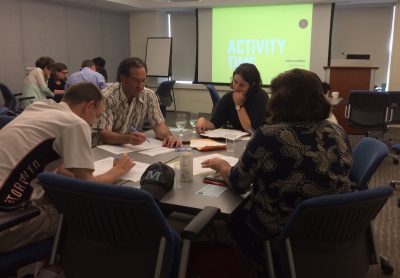Project Showcase: Science History Institute’s History Lab
20 April 2018 – Rebecca Ortenberg

Participants discuss the future they imagine for a local neighborhood during the “Communities and the Future” program on July 15, 2017. Photo credit: Rebecca Ortenberg.
What did medical self-tracking look like in the past, and how will it look in the future? How do we plan for the future of our communities in a world where the climate is changing? Does science fiction influence scientific research? These are just some of the questions audiences grappled with in History Lab, a new public program series at the Science History Institute in Philadelphia. In the summer of 2017, the Institute launched this series with three programs that explored conceptions of “the future”: Bodies and the Future, Communities and the Future, and Fiction and the Future. Three new programs exploring scientific data are planned for the summer of 2018.
Like many dialogue-based learning programs, including those created by the International Coalition of Sites of Conscience, each of the programs began with an ice breaker–a low-stakes but intimate discussion that encouraged participants to contemplate and share their personal experiences. For example, in the Communities and the Future program, which looked at the intersections of urban planning, environmental change, and community identity, participants shared something about their hometown or neighborhood that they thought was misunderstood. After each program’s ice breaker, a scholar from the Science History Institute talked about their work on a related topic.
During Bodies and the Future, historian Deanna Day discussed her research on the history of the thermometer and its connection to modern technology like the Fitbit. Finally, participants dug into a more in-depth activity and discussion meant to encourage staff, scholars, and participants to learn from one another.
In Fiction and the Future, participants played the card game The Thing from the Future, which asks participants to create a futuristic story based on a series of random prompts. The activity came after a presentation about scientists’ perspectives on science fiction, which stressed how the stories we tell about the future can influence discoveries made today. We hoped that participants would come away understanding that it matters what kinds of stories we tell about the future and who gets to tell them. To our delight, participants brought up this precise point in discussion, noting that the whiteness and maleness of much mainstream science fiction severely limits what we as a society imagine the future might be like.
This eagerness to attack hard questions and complex concepts head-on was also clear in visitor survey results. Eighty-seven percent of respondents told us that they “gained a new perspective” over the course of the program. In written comments, participants called the program “Illuminating and thought-provoking.” Staff also took ethnographic notes during the programs and held regular evaluation check-ins. Through every type of evaluation, participants expressed similar opinions.
In a city like Philadelphia, audiences can learn about science through a variety of institutions and a plethora of activities. But public audiences have fewer opportunities to talk with each other about how history and culture inform science and what it means to them. Through programs like History Lab, the Science History Institute offers unique, transformative opportunities to do just that.
~ Rebecca Ortenberg is a history communicator based in Philadelphia. As a program associate at the Science History Institute, she devises public programs and develops digital content that show scholarly research in action. She is also the managing editor of Lady Science, an online magazine focused on women in the history of science, technology, and medicine.



